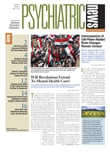Although about 40 percent of Alzheimer's patients will experience psychotic symptoms at some point in the course of their illness, the prescription of antipsychotics for Alzheimer's and other dementia patients has plunged during the past few years, a new study has found.
The study was headed by Helen Kales, M.D., an associate professor of psychiatry at the University of Michigan and a research scientist at the Veterans Administration (VA) Center for Clinical Management Research. Study findings were published in the February Archives of General Psychiatry.
The researchers examined changes in use of atypical and conventional antipsychotics in American military veterans with dementia from 1999 through 2007—altogether some 255,000 subjects. These years encompassed three periods—1999 to 2003, when trials were just starting to document the risk of diabetes, stroke, and death from antipsychotics in elderly dementia patients; 2003-2005, when evidence from such trials continued to build; and 2005-2007, after the Food and Drug Administration (FDA) issued a black-box warning that stated that using atypical antipsychotics to treat elderly patients with dementia was associated with increased mortality.
In 1999, 18 percent of dementia patients were taking either atypical or conventional antipsychotics. Overall use began to decline during 1999-2003, declined a little more during 2003-2005, and even further during 2005-2007. By 2007, overall use of antipsychotics in dementia patients had dropped to 12 percent.
That the decline in antipsychotic use started well before 2005-2007, when the black-box warning was in effect, surprised her, Kales told Psychiatric News. She believes that the decline was due to a number of factors, including emerging concerns about significant side effects of atypicals, such as diabetes and stroke, national VA internal communications about potential side-effect concerns, and the Office of the Inspector General of the Department of Health and Human Services issuing compliance guidelines restricting the ability of drug companies to market off-label uses of medications, such as the use of antipsychotics for patients with dementia.
The decline in antipsychotic prescriptions for those with dementia poses a dilemma for the families of these patients. If clinicians are reluctant to prescribe antipsychotics for such patients, then how can the families deal with their loved ones' psychotic symptoms?
Even though studies have shown that antipsychotics are of limited benefit to dementia patients and can be dangerous for them, there are still times when they should be used, Kales maintained.
"I believe that it is all about risk/benefit and effective informed-consent procedures with patients' families … . If psychotic symptoms are present and severe, an antipsychotic may be the most appropriate medication. Conversely, targeting a symptom such as wandering with an antipsychotic (for which it is unlikely to be effective, except as a sedative, which may cause falls) is not a good idea. Finally, providers should periodically attempt discontinuation trials of antipsychotics rather than keeping patients on them long term."
And there are interventions other than antipsychotics that can be used to control psychotic symptoms in dementia patients, Kales pointed out. "The truly optimal approach may be behavioral management of symptoms, managing the caregiving environment, and reserving medications for those cases where the symptoms are severe and impair function in the home."
Both the American Association for Geriatric Psychiatry (AAGP) and the FDA have urged clinicians to adopt a risk-benefit approach when determining whether patients with dementia should get antipsychotics, Kales and her team noted in their report. Specifically, the AAGP and the FDA have advised that antipsychotics should be used only for psychotic symptoms that endanger either the patients with dementia or their families. If the patients are agitated, they should receive anticonvulsants, not antipsychotics, and if they are depressed, they should receive antidepressants rather than antipsychotics, the two organizations recommended.
The study was funded by the National Institute of Mental Health and the Serious Mental Illness Treatment, Research, and Evaluation Center in Ann Arbor, Mich.
